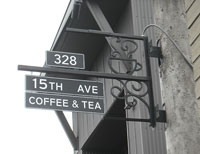
... then you need this t-shirt.



| The Daily Show With Jon Stewart | Mon - Thurs 11p / 10c | |||
| The Born Identity | ||||
| www.thedailyshow.com | ||||
| ||||
The problem is most of the above facts aren’t true.
For starters, the Pakistan “travel ban” is a complete fabrication based on zero evidence and completely contradicted by State Department records and a 1981 New York Times article. The full transcript from Obama’s grandmother shows that she never said he was born in Kenya—in fact, she repeatedly said he was born in Hawaii. The law allowing foreign-born children to obtain Hawaiian COLBs didn’t exist until 20 years after Obama was born, while Obama’s published COLB says his birth information was recorded four days after his birth in 1961. And those “forensic experts” who say Obama’s document is phony? There have only been three of them: Two haven’t published their real names or any verifiable credentials (one went by the moniker “TechDude”), and the other merely said that she can’t make a determination of a document’s authenticity based solely on a JPEG.
***
“It’s just fascinating,” says Bob Haggard, a frequent poster on Politijab’s Orly Taitz forum. “She runs around the country doing things that amount to absolutely nothing. She tells her followers that she ‘files’ all sorts of documents, but she never files anything. She drops stuff off.”
Patrick McKinnion of Yes to Democracy puts it a different way: “There’s a certain amount of fascination with unbridled insanity, and that’s what you’re seeing with the birthers: a level of hatred that borders, if not absolutely pole-vaults, into insanity.”
Rick Buila, 38, of Sharonville, Ohio, who works in finance and voted for the McCain-Palin ticket in November, said his opinion of the governor has changed. "I don't think that she is cut out to be on the national stage," he said. "I look at her education and her background and the way she carries herself and her [resignation] speech, and when you have someone who's out there saying 'You betcha' about 50 times, I don't think that's the person we want to have negotiating with other countries."

Real sustainability... is defined not by a food system's capacity to ensure happy workers or organic lima beans, but by whether the food system can sustain itself—that is, keep going, indefinitely, in a world of finite resources. A truly sustainable food system is inherently resilient—more capable of self-correction and self-revitalization than its industrial rival. Unfortunately, in the real world of farming, ideas like "resilience" must compete with realities like "costs" and "profits," and producers and consumers alike gravitate toward simpler standards—even if those standards don't represent truly sustainable practices. Worries Kirschenmann, "We've come to see sustainability as some kind of fixed prescription—if you just do these 10 things, you will be sustainable, and you won't need to worry about it anymore."




A police report said they sat down for a kiss and were approached by a pair of church security guards, who asked them to leave because their behavior was "unwanted."

i visited the monterey bay site, and discovered they also offer a handy iphone app, so you can make better choices when you're in a store or restaurant. while the post article points out there's not much info about carbon footprints, that info isn't very widely available. and even if we can make our choices a little more smart, that's better than an altogether dumb one.The most straightforward thing you can do is avoid eating any species that has been consistently overfished. According to a recent report from the United Nations' Food and Agriculture Organization, 28 percent of global fish stocks were overexploited, depleted or recovering from depletion in 2007. Another 52 percent were fully exploited, meaning that catch levels had either been reached or were close to their maximum sustainable limits. (For more on the world's overfishing problems, watch the new documentary "The End of the Line," billed as "An Inconvenient Truth" for the seafood industry.)
To find out how your favorite fish is doing, check out the Monterey Bay Aquarium's popular Seafood Watch program, which rates both wild-caught and farm-raised seafood as "best choice," "good alternative" or "avoid." For wild-caught fish, the program looks at stock levels but also takes fishing techniques into account, because some types of gear result in greater damage to the marine environment or higher levels of collateral damage to nontarget species. For farmed fish, which are often raised in net-pens in the open ocean, Seafood Watch looks at the potential for pollution and disease transference to the ecosystem. (Wild-caught Alaskan salmon, canned albacore tuna and farmed rainbow trout all get high marks under this program.) In the supermarket, look for the Marine Stewardship Council's eco-label, a blue oval with a fish and a checkmark. That certifies that products come from sustainable fisheries.
Visit msnbc.com for Breaking News, World News, and News about the Economy






| The Daily Show With Jon Stewart | Mon - Thurs 11p / 10c | |||
| The Craziest Catch | ||||
| www.thedailyshow.com | ||||
| ||||
all things sweet and snotty